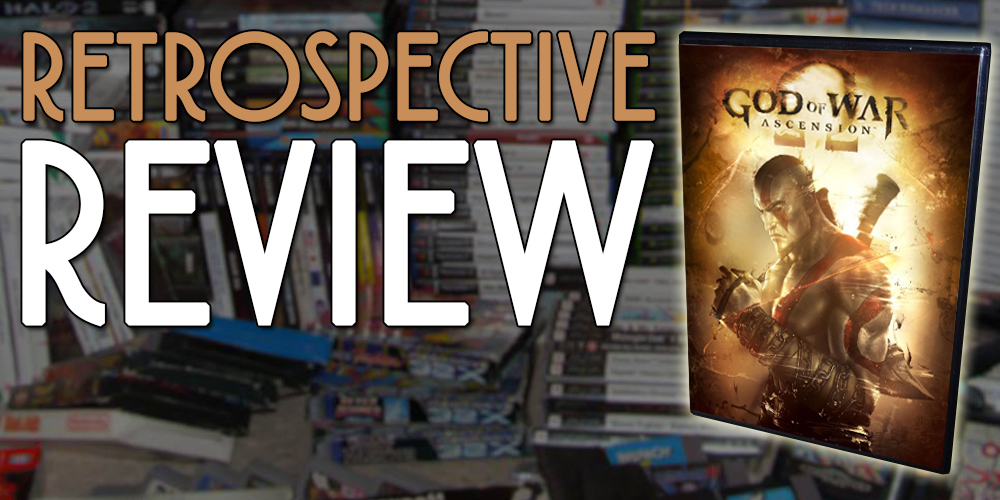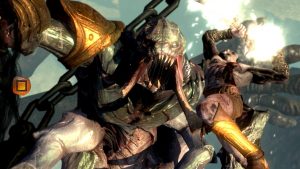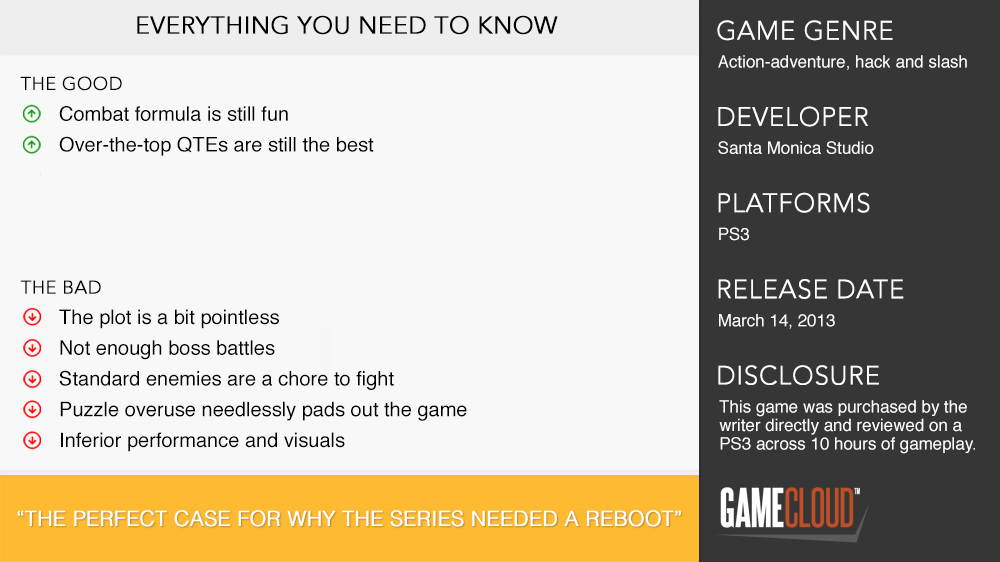
How the hell did we get so sick of God of War (GoW) that it took half a decade to resurface? A person unfamiliar with the series might look at GoW Ascension (hereafter referred to as Ascension) for the answer and come away none the wiser. It’s got everything one might expect from a AAA action game, including outwardly lavish production values, over-the-top scripted sequences, bombastic ultra-violence, and an iconic lead character. With the anticipation of the Norse-themed soft-reboot/re-quel of the series just having launched, I took the time to play the last major release in the franchise to find out why exactly it took so long for Kratos to come back from the dead. Having played every game in the series save for this one, I had middling expectations which were mostly met but never exceeded.
Ascension tells the story of how Kratos came to defy the wrath of the Furies, yet another all-powerful force in the nebulously defined hierarchy of Santa Monica Studio’s rendition of mythological Greece. Set 6 months after the death of his wife and daughter, thus taking place after Chains of Olympus but before the first God of War, the plot plays out of chronological order, starting in the middle of the story with Kratos in chains and being tortured by one of the Furies. While the story’s pacing is initially intriguing, the premise of Kratos in bondage isn’t a dramatic or even novel one. Any level of familiarity with the series disarms the ambition of the plot’s creative pacing – I wasn’t the least bit worried about the angriest man in gaming getting out of yet another sticky pickle because I’ve seen him get out of far worse. And yes, pretty much exactly what you expect to happen does indeed happen. Kratos dismembers, disembowels and pulverises fictional antiquity until the credits roll, and is left as he came in; brooding, tortured and vengeful.

Looking back, the events portrayed in God of War III were so wholly apocalyptic, with basically all of Greek mythology having been destroyed by Kratos’ hand, that it was reasonable to expect that his butcherings had all but come to an end – at least in the realms of ancient Greece, anyway. As a result, the premise of Ascension being a prequel disappoints right off the bat as a follow-up. It’s fair to say that Kratos most definitely falls into a clichéd character trope, but he’s still always struck me as an earnest parallel with tragic heroes of Greek myth like Heracles and Odysseus. While he is a man of violence, he is also a victim of the machinations of the Gods, who are as pernicious in this series as they are said to be in the stories of old. He’s an archetype defined in a way that is rarely so fitting for an action game. And yet, he’s never changed in any significant or interesting way. Yes, it’s a prequel, but after eight years and seven titles in the series, Kratos failed to evolve as a character over that time and still hadn’t here.
Like the story, the gameplay here is good but suffers from feeling too familiar. The combat in Ascension plays similarly to GoW III and retains the same basic hack n’ slash formula. The problem, however, is Ascension has more detractions than fun additions to the formula. There aren’t any upgradeable alternate weapons, but instead, there are four flavours of the blades of chaos. The magic system is also much more frugal than those of past games, which were quick to hand players devastating spells that would quickly level a combat scenario. Not only are magic attacks initially weaker here, they also take longer to acquire and require a greater investment of red orbs to become useful. Further detracting from this design choice is that basic enemy types have greater defensive capabilities and larger health pools than I remember the average GoW peons ever having. It also has the “trials of Archimedes,” which is the most frustratingly cluttered, claustrophobic final gauntlet I’ve played in this series.

The central gimmick which separates Ascension’s combat from previous entries is the ability to equip swords, clubs, spears and shields dropped by your enemies, which I guess is there to soften the blow of only having a decade old weapon design throughout. More often than not, though, I found myself relying mostly on established combos I’ve committed to memory and desperately missing old toys like the Nemean Cestus, the Bow of Apollo, and so on. For me, the best parts of this series’ formula has always been its ancillary elements – the incredible use of perspective and scale in level designs, simple yet exciting puzzles, and cathartic quick-time-events, and these are all mostly present in Ascension. The problem, however, is puzzles are abnormally abundant, frequently obtuse, and needlessly pad things out. Considering there also aren’t as many boss battles as there were in GoW III, in which the central puzzle tool was an instrument of spectacle, the “Amulet of Uroboros” feels more like of a design crutch than an exciting device.
It’s difficult to shake the suspicion that the campaign in Ascension isn’t everything it could have been or even SHOULD have been. That suspicion began for me the moment it was initially revealed, where they first showed off the multiplayer component. Sony’s act of haplessly parroting big publishers of the time by shoving shoddily conceived and hastily prototyped multiplayer modes into historically single-player focused franchises was the death knell for my appreciation for this series, and there isn’t any redemption to be found in playing Ascension. Well, the single-player, that is – I haven’t tried the multiplayer as the pre-owned copy I have requires an extra $10 purchase of an online pass. I wish I could say I didn’t purchase it solely out of principle, but I also genuinely don’t have the money to waste on things I already own. And here’s the kicker – performance is choppy for the first time in a series revered to have visual fidelity verging on black magic, and aside from the lighting, comes off less pleasing to the eye than its predecessor.

Ascension isn’t a bad game, but it is the worst game in the God of War series for some sad reasons. The high bar set by the supposed final chapter in the series was not even close to being met by Ascension, and how could it be? Its very concept as an unnecessary prequel is a detracting factor, and everything else on top of that is another layer in a cynical capitalist shit-sandwich that almost reads like a checklist. I admit I had fun, rote as it was, in my 10 hours in the campaign. It’s just that I couldn’t ignore the snark inside me repeating one line at regular intervals through my travails, “Ascension? You mean God of War: Another One?” I have no doubt now that rebooting the series was the right call.











